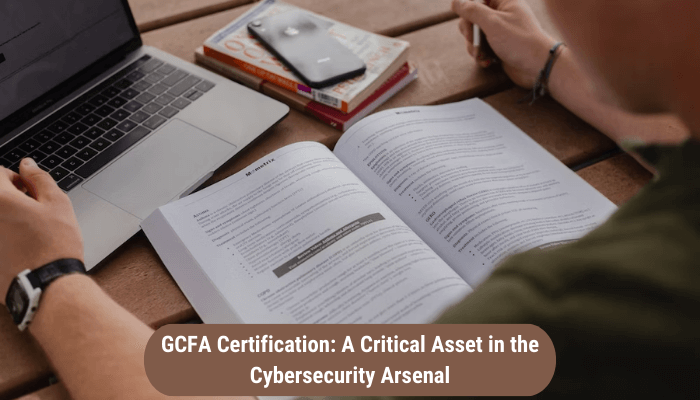Cybersecurity demands professionals with specialized skills in analyzing and mitigating security incidents, making certifications like the GIAC Certified Forensic Analyst (GCFA) highly valuable. GCFA certification is tailored for individuals who aim to excel in incident response, threat hunting, digital forensics, and other related roles.
Who Is the Target Audience for GCFA Certification?
The GCFA certification is designed for a diverse range of professionals, including.
- Incident Response Team Members
- Threat Hunters
- SOC Analysts
- Experienced Digital Forensic Analysts
- Information Security Professionals
- Federal Agents and Law Enforcement Professionals
- Red Team Members, Penetration Testers, and Exploit Developers
GCFA Certification Exam Overview
- Exam Name: GIAC Certified Forensic Analyst (GCFA)
- Exam Code: GCFA
- Exam Price: $979 (USD)
- Duration: 180 minutes
- Number of Questions: 82
- Passing Score: 71%
GCFA Certification Exam Syllabus Topics
The test encompasses various subjects crucial for forensic analysts, including.
- Analyzing Volatile Malicious Event Artifacts
- Analyzing Volatile Windows Event Artifacts
- Enterprise Environment Incident Response
- File System Timeline Artifact Analysis
- Identification of Malicious System and User Activity
- Identification of Normal System and User Activity
- Introduction to File System Timeline Forensics
- Introduction to Memory Forensics
- NTFS Artifact Analysis
- Windows Artifact Analysis
GCFA Certification Benefits
1. Formal Incident Investigations
- Structured Expertise: The GCFA course equips participants with the knowledge and skills to conduct formal incident investigations. This implies a structured and systematic approach to handling security incidents.
2. Handling Advanced Incident Scenarios
- Data Breach Intrusions: Participants will learn to manage internal and external data breach intrusions, demonstrating the capability to secure sensitive information in various contexts.
- Advanced Persistent Threats (APTs): The course covers the intricacies of advanced persistent threats, providing participants with the skills to identify, respond to, and mitigate these sophisticated and prolonged cyber-attacks.
- Anti-Forensic Techniques: Understanding and countering the anti-forensic techniques that attackers use is crucial. Participants will gain insights into how to preserve and analyze digital evidence effectively.
3. Comprehensive Digital Forensic Skills
- Multifaceted Expertise: The course ensures participants are well-rounded in handling complex digital forensic cases. This includes navigating diverse scenarios involving different platforms, devices, and network environments.
- Practical Application: The instruction highlights hands-on skills, empowering participants to utilize their expertise in real-world scenarios related to digital forensics.
The accelerated GCFA course provides participants with a comprehensive set of advantages. It covers formal incident investigations, advanced incident handling scenarios, and a broad range of digital forensic skills. Participants emerge with the expertise needed to handle complex cybersecurity incidents, including data breaches, advanced persistent threats, and anti-forensic techniques employed by attackers. This knowledge is practical and applicable in diverse and challenging cybersecurity environments.
How to prepare for the GCFA Certification exam?
1. Create a Study Plan
Creating a well-organized study schedule is essential for practical exam readiness. Divide the curriculum into manageable segments and assign dedicated time intervals for each. Consider your daily commitments and set realistic study goals. A well-organized plan helps you cover all topics thoroughly and reduces last-minute stress.
2. Understand the Exam Structure
Familiarize yourself with the format and structure of the GCFA exam. Comprehend the various question formats, time limitations, and the overall examination setting. This knowledge allows you to strategize your approach, allocate time wisely during the exam, and navigate through questions more efficiently.
3. Take Up Training Courses
Enroll in reputable GCFA training courses offered by authorized providers. These courses provide in-depth coverage of exam topics, hands-on labs, and practical scenarios. The structured curriculum ensures you comprehensively understand the subject matter, enhancing your overall readiness for the exam.
4. Index Your Course Books
Create an organized index for your certification materials. This involves quickly creating a reference guide to locate critical concepts, definitions, and essential information. An indexed set of course books becomes a valuable resource during the revision phase, saving time and helping reinforce your understanding of critical topics.
5. Stay Updated with Industry Trends
Cybersecurity constantly evolves, and staying abreast of the latest industry trends is crucial. Follow reputable cybersecurity news sources, blogs, and forums to stay updated on emerging threats, technologies, and best practices. This knowledge not only aids in answering contemporary questions but also demonstrates a commitment to ongoing professional development.
6. Join Study Groups
Collaborate with peers preparing for the GCFA exam by joining study groups. Discussions with others can provide different perspectives, clarify doubts, and offer insights into challenging topics. Sharing resources, experiences, and study techniques within a study group can contribute significantly to your overall understanding and retention of information.
7. Focus on Weak Areas
Identify your weaker areas through self-assessment or practice exams. Allocate more study time to topics where you feel less confident. Understanding your weaknesses allows you to tailor your study plan and address specific areas needing additional attention. This targeted approach improves overall competency.
8. Take GCFA Practice Exams
Practice exams are invaluable for simulating the actual exam experience. They help you familiarize yourself with the question format, assess your time management skills, and identify areas requiring further review. Analyze your performance in practice exams to understand your strengths and weaknesses, adjusting your study plan accordingly.
Incorporating these tips into your preparation strategy will build a strong foundation for success in the GCFA certification exam. Remember to balance theoretical knowledge and practical application, and approach your studies with dedication and consistency.
Conclusion
In conclusion, the GCFA certification offers a pathway to becoming a proficient digital forensic analyst capable of handling complex cybersecurity incidents. By combining theoretical knowledge with practical skills, certified professionals are well-prepared to navigate the challenges presented by data breaches, advanced persistent threats, and anti-forensic techniques employed by cyber attackers. Prepare diligently and follow a strategic study plan, and you’ll be on your way to mastering the GCFA certification.






